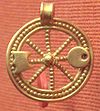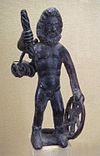- Ogmios
-
For the linguistics journal published by the Foundation for Endangered Languages, see Ogmios (journal). For the Lithuanian group of companies in real estate business, see Ogmios group.
Ogmios (also known as Ogmius) was the Celtic deity of eloquence.[1] He looked like an older version of Heracles.[2] He was also a binding god who would use his powers of persuasion to bind men onto himself and then lead them into the underworld.[1][3]
Most of the knowledge about Ogmios comes from comparisons between him and powerful deities and heroes in other ancient cultures.[1][3]
Contents
About the Deity
Even though there is not much on the history of Ogmios, we can tell that he was a powerful deity worshipped by the Gauls, the Celtic people of France. By looking at records and art dated to the time period of the Roman conquest of the Gauls, there is evidence of his existence.[1][3]
Physical Description
Ogmios was recorded by Lucian, a satirical writer in 2 A.D. Rome, as resembling an older, tanner version of Heracles, the Greek hero of strength. Ogmios and Heracles both wear lion skins and carry a bow and club in their hands. However Ogmios is depiected with long chains through his smiling mouth that pierce his tongue and attached to the ears of a group of men that willing and happily follow him.[1][2][3] According to Celtic belief wisdom increases with age and dark skinned supernatural beings are often powerful.[4] Since Ogmios has both features he too possesses great wisdom and great power. The most striking aspects of Ogmios' image are the thin, long chains running from his tongue to the ears of his followers. The chains, made of precious metals, represent Ogmios using his powers of persuasion and eloquence to bind his listeners to his every word.[1][5] From the description it appears that Ogmios' followers willing follow him with cheerful faces and try to get as close to Ogmios as they can. This shows that he has the power to change and influence men’s minds so that they want to follow him to the ends of the earth.[1][3]
Roles
Ogmios is considered to be a binding god and a psychopomp both very powerful positions.[1][3] As a binding god he has the ability to bind people onto himself and control their actions. He can also create defixiones, which are tablets that have curses which he can bind on to other people. There are two known defixiones recovered from Bregenz, Austria, that Ogmios is said to have created.[1][3] Not much is known about the story behind the defixiones, but it is known that one such tablet invokes Ogmios to cast curse on a barren woman so that she can never marry a man.[3] Ogmios is also a psychopomp which is like a binding god except that a psychopomp binds the souls of the dead onto themselves and leads them to the afterlife.[6][7]
Comparisons to other Cultures
Almost all of the knowledge about Ogmios comes from the comparisons of him to other deities or divine heroes of different ancient cultures. By about 51 B.C. the Roman Empire had conquered Gaul. When the Gauls disappeared so did Ogmios. However the existence of Ogmios can still be seen in Irish mythology. Their deity, Ogma, has many similarities to Ogmios, which could mean that they were once the same deity.
Greek/Roman
Long after the Romans conquered the Gauls, the Roman satirist Lucian wrote a satirical story about Celtic beliefs. It describes Lucian and a Celtic man looking at a painting of Ogmios. Lucian's description of the painting is the main source of visual representation of Ogmios.[2]
Initially Lucian looks at the painting with horror because the painting says that the Celts liken Ogmios to Heracles. Ogmios appears to be an older version of Heracles, since both Ogmios and Heracles wear lion skins and carry a bow and club.[2] Lucian is shocked to see that “the (bound) men (following Ogmios) do not think of escaping…In fact, they follow cheerfully and joyously, applauding their leader and all pressing him close and keeping the leashes slack in their desire to overtake him; apparently they would be offended if they were let loose!” (pg 65)
In the story, a Celtic man explains that the painting shows how the Celts believe Ogmios is similar to Heracles,[2] the Greek hero who defeated many things with his strength. Heracles has the power of strength and Ogmios has the power of eloquence. The Celts believe that eloquence is the ultimate power because it can enthrall men and control them more so than strength can.
Ogmios is also sometimes compared to Hermes, a Greek deity.[3] Hermes is also a god of eloquence and a guide to the underworld, just like Ogmios. To the Greeks Hermes was the symbol of eloquence, just as Ogmios is to the Celtics. Hermes is also a psychopomp, just like Ogmios. However he is weak god. That is why the Celtics choose Heracles to be their representation of Ogmios; Heracles has more power than Hermes.[2]
Irish
The Irish deity closest related to Ogmios is Ogma.[3][6] These two deities have a lot in common, so much so that it is unclear if Ogmios and Ogma are related or the same deity.[1][3][6] Both Ogmios and Ogma are known as the deities of eloquence and depicted as smiling all the time.[1][3] It is possible that both are related to same deities.[1][3] Ogmios appear to have existed before Ogma, but when Ogmios slowly disappeared with the Gauls, Ogma appeared took his place.[3][6]
References
- ^ a b c d e f g h i j k l OGMIOS-OGMA, Kernunnos Group of Web Page
- ^ a b c d e f Lucian. The Works of Lucian : with an English Translation by A.M. Harmon.I Cambridge, Massachustte: Harvard University Press, 1913. 63-67. Print.
- ^ a b c d e f g h i j k l m n Ogmios - A Gaulish and Irish God, also known as Ogma, Ogmia, Celtnet.org UK
- ^ http://www.jstor.org.proxy.library.ucsb.edu:2048/stable/pdfplus/2847977.pdf
- ^ http://www.jstor.org.proxy.library.ucsb.edu:2048/stable/pdfplus/640758.pdf
- ^ a b c d Seeking the Wisdom of the Ancestors: A Form of Indo-European Divination, Ceisiwr Serith, Ár nDraíocht Féin: A Druid Fellowship (ADF)
- ^ Brunaux, Jean Louis. The Celtic Gauls: Gods, Rites and Sanctuaries. London, Great Britain: B.A. Seaby, 1988. 72. Print.
- Egger, Rudolf. (1962–63). Römische Antike und frühes Christentum: Ausgewählte Schriften von Rudolf Egger; Zur Vollendung seines 80. Lebensjahres, ed. Artur Betz and Gotbert Moro. 2 vols. Klagenfurt: Verlag des Geschichtsvereines für Kärnten
External links
- Ogmios - A Gaulish and Irish God, also known as Ogma, Ogmia, Celtnet.org UK
- OGMIOS-OGMA, Kernunnos Group of Web Page
Celtic mythology series Ancient deities of Gaul, Britain and Gallaecia by region Supra-regional Alaunus • Alisanos • Andarta • Anextiomarus • Artio • Aveta • Belenus • Belisama • Borvo • Brigantia • Camulus • Cernunnos • Cicolluis • Cissonius • Condatis • Damona • Matrona • Dis Pater • Epona • Erecura • Esus • Genii Cucullati • Grannus • Ialonus Contrebis • Lenus • Litavis • Loucetios • Lugus • Maponos • Matres • Mogons • Nantosuelta • Ogmios • Rosmerta • Segomo • Sirona • Sucellus • Suleviae • Taranis • Toutatis • Virotutis • VisuciusBritannia Gallia Aquitania Gallia Belgica Abnoba • Ancamna • Arduinna • Arvernus • Icovellauna • Inciona • Intarabus • Iovantucarus • Ritona • Veraudunus • Vindonnus • Vosegus • XulsigiaeGallia Celtica Gallia Cisalpina Gallia Narbonensis Germania Inferior Gallaecia Categories:- Ancient Gaulish and British gods
- European mythology
Wikimedia Foundation. 2010.


